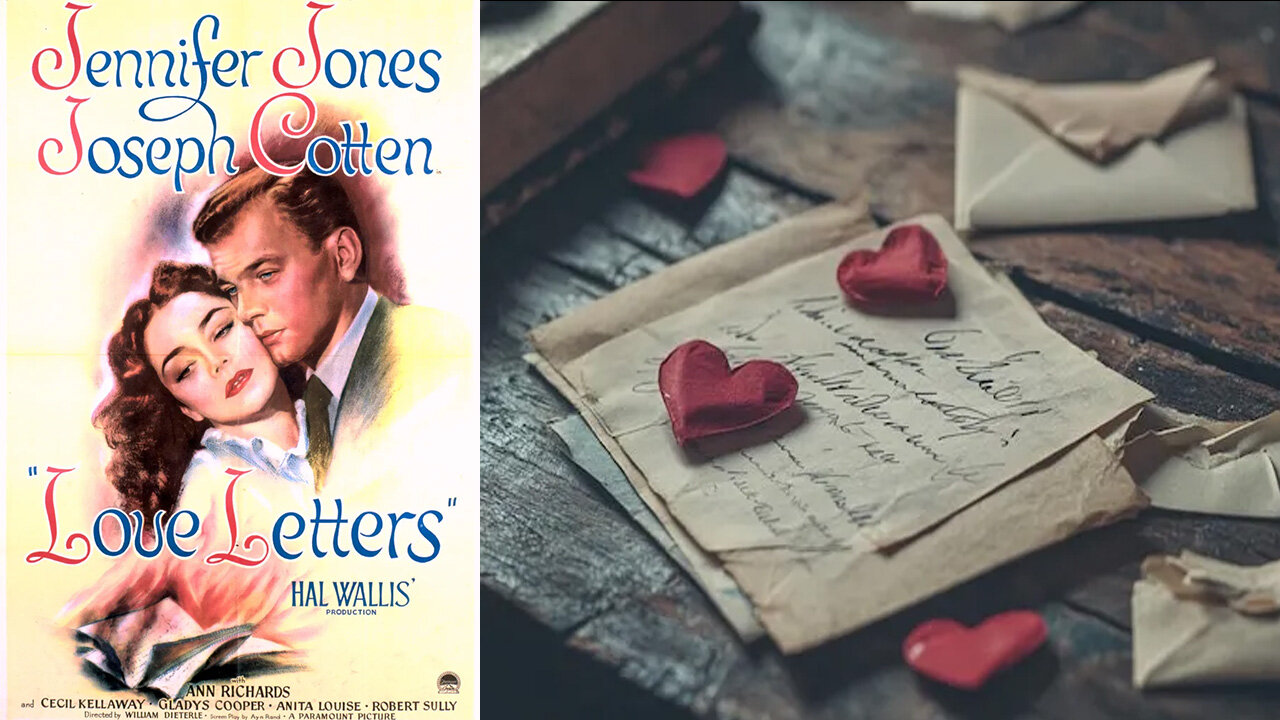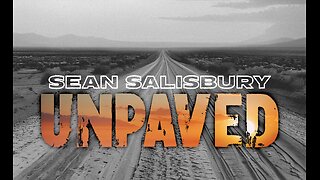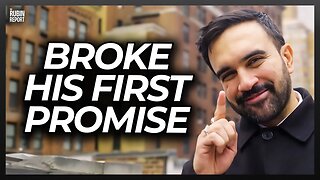Premium Only Content

'Love Letters' (1945) Movie - Screenplay by Ayn Rand
'Love Letters', directed by William Dieterle and adapted from the novel Pity My Simplicity by Christopher Massie, is a romantic mystery film notable for its screenplay by Ayn Rand. While Rand is better known for her philosophical novels and the development of Objectivism, her work in Hollywood offers an intriguing insight into her evolving moral and ideological outlook. 'Love Letters' stands as one of her more mainstream, emotionally-driven projects, diverging from her usual didactic tone and yet retaining her preoccupations with identity, integrity, and the inner life of individuals.
Plot and Structure: The story revolves around Alan Quinton (played by Joseph Cotten), a sensitive soldier during World War II who writes love letters on behalf of his illiterate comrade, Roger Morland. The recipient is Victoria Remington (Jennifer Jones), a young woman who, through the passionate letters, falls in love—not with Roger, but unknowingly with Alan. What follows is a tangle of mistaken identity, tragic consequences, and eventual revelation as Alan searches for the woman he truly connected with, even though their bond was forged entirely through words.
The structure of the film hinges on romantic irony: the protagonist and the audience are aware of a hidden truth that the heroine is struggling to remember, due to a traumatic amnesia resulting from a violent act. The mystery unfolds through fragmented memories, poetic language, and a spiritual sense of destiny, making the film an unusual blend of noir suspense and lush romanticism.
Ayn Rand’s Influence: Rand’s contribution to the screenplay is both evident and paradoxical. On the surface, 'Love Letters' appears almost antithetical to her hard-edged rationalist philosophy—it’s sentimental, dreamy, and emotionally expressive. Yet beneath the romantic fog lie several of Rand's key themes: the power of the individual spirit, the moral weight of authorship, and the idea that true love is a recognition of the self in another. Alan is, in effect, a creator—the writer of the letters—and Victoria falls in love with that essence. The film suggests that identity is not only formed by action but also by the expression of thought and feeling, a Randian concept softened for cinematic romance.
Moreover, the film subtly explores a moral hierarchy. Roger is presented as crude and undeserving, a false claimant to Victoria’s love. His inability to communicate meaningfully disqualifies him in the moral universe Rand constructs. Alan, by contrast, is the noble soul—an intellectual and emotional aristocrat whose thoughts transcend the material world. This aligns with Rand’s belief in the superiority of the thinking individual over the brute or the collective mass.
Character and Performance: Joseph Cotten delivers a performance imbued with quiet sensitivity, embodying the introspective qualities of Rand's idealized intellectual man. Jennifer Jones’ Victoria is a more ambiguous figure. Torn between memory and trauma, her role could be seen as too passive for Rand’s usual heroines, who are typically strong-willed and ideologically steadfast. Yet Jones brings a gentle strength to the character, especially as the layers of her psyche are peeled back to reveal a woman whose love was based on truth—even if obscured by circumstance.
Supporting characters are drawn less clearly, functioning more as plot devices than philosophical foils. The real tension resides in the emotional and moral journey of the two leads. As such, the film remains intimate in scale, focused on internal conflict rather than sweeping external drama.
Style and Tone: Dieterle’s direction gives the film a dreamy, almost gothic atmosphere, enhanced by Victor Young’s haunting score. The cinematography often places characters in shadow, behind veils or frames, reinforcing the themes of hidden identity and obscured truth. These aesthetic choices complement Rand’s script, which is unusually lyrical, even poetic, compared to her more didactic fiction.
What distinguishes the film from other romantic dramas of the era is this tension between ethereal sentiment and philosophical rigor. Rand’s dialogue, while softer here, still bears her stamp: elevated, literate, and sometimes slightly self-conscious in its desire to elevate the romantic above the banal.
Critique and Context: For Rand’s admirers, 'Love Letters' might seem like an odd relic—a flirtation with sentimentality that lacks the sharp ideological certainty of The Fountainhead (1943) or Atlas Shrugged (1957). For those less invested in her philosophy, it may come across as a curious example of classic Hollywood romanticism shaded with intellectual longing.
Rand herself later dismissed much of her screenwriting work, including 'Love Letters', as compromises or commercial necessities. Yet the film arguably reveals a more human side of her worldview, one that allows for the irrationality of love and the fragility of memory without sacrificing the belief in authenticity and personal truth.
Conclusion: 'Love Letters' is a rare artifact: a romantic melodrama penned by one of the 20th century’s most polarizing rationalist thinkers. While it may not conform strictly to the tenets of Rand’s later philosophy, it is infused with her enduring themes of identity, authorship, and moral clarity. As a cinematic experience, it is both touching and intriguing—a love story where the soul is revealed through words, and where truth, however buried, inevitably finds its way to light.
It is not a perfect film, but it is a compelling one, and as a work of Ayn Rand’s, it offers a glimpse into a transitional phase of her thinking—when emotion and reason, heart and head, were not yet fully at war.
-
 LIVE
LIVE
Dr Disrespect
5 hours ago🔴LIVE - DR DISRESPECT - ARC RAIDERS - QUEST MASTER
2,307 watching -
 1:57:50
1:57:50
The Charlie Kirk Show
4 hours agoErika's Interview + Auburn Aftermath | Schlichter, Lomez | 11.6.2025
76.3K11 -
 1:02:01
1:02:01
Sean Unpaved
3 hours agoTragedy Strikes: Kneeland's Remembrance, Spo's Inferno, CFB HC Rumors, & TNF Raiders-Broncos' Odds
37.7K -
 1:01:46
1:01:46
Timcast
4 hours agoBannon RIPS GOP For Dismissing Zohran, "This Is Very Serious"
125K86 -
 2:12:18
2:12:18
Side Scrollers Podcast
5 hours agoSide Scrollers VTuber TAKE OVER with Kirsche, Rev Says Desu & DarlingStrawb | Side Scrollers
52.8K4 -
 LIVE
LIVE
StoneMountain64
2 hours agoArc Raiders is actually INCREDIBLE
89 watching -
 2:03:04
2:03:04
MattMorseTV
5 hours ago $0.89 earned🔴Trump’s EMERGENCY Oval Office ANNOUNCEMENT.🔴
72.5K72 -
 LIVE
LIVE
GrimmHollywood
6 hours ago🔴LIVE • GRIMM HOLLYWOOD and BIG TALL REDNECK • 3K 3XL TAKEDOWN • PGA • BF6 REDSEC • ARC RAIDERS
78 watching -
 3:11:27
3:11:27
Right Side Broadcasting Network
19 hours agoLIVE REPLAY: President Trump Makes an Announcement - 11/6/25
152K64 -
 1:04:07
1:04:07
The Rubin Report
5 hours agoZohran Mamdani Humiliates Himself by Breaking His First Promise Only 24 Hours After His Win
90.4K158